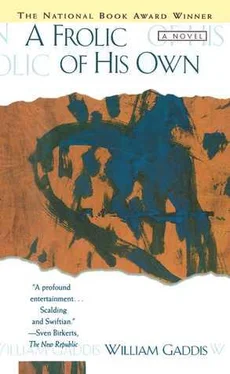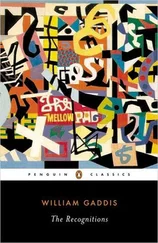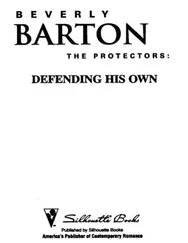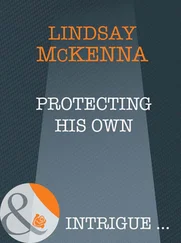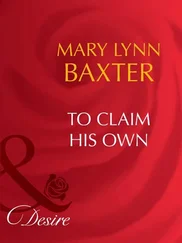— This? It looks like something legal, I should have guessed. You're a lawyer, Mister Crease?
— Thank you. No, I dabble in it, Mister Gribble, I only dabble. Good night.
— You only dabble, do you? came from behind the curtain over eager revelations of a six car collision on Route 4. —Like a little dab of that myself, that was some hot number.
— Be quiet.
— A little dab'll do you, a little dab'll…
— Shut up! and he settled back into the pillows, squaring his glasses as best he could, managing some sagging measure of dignity commensurate with the pages before him. And so we may as well begin this sad story with the document that has set things off or, better, that merely paced the events that follow, spattered as it was all over the newspapers, since it had nothing directly to do with them, much less its remote participants, distant in every way but the historic embrace of the civil law in its majestic effort to impose order upon? or is it rather to rescue order from the demeaning chaos of everyday life in this abrupt opportunity, as Christina has it, to be taken seriously before the world, in an almost inverse proportion to their place in it, their very names in fact and the inconsequential nature of their original errands, like that woman intending no farther than Far Rockaway suddenly lofted to landmark status by Justice Cardozo in Palsgraf v. Long Island Railroad, or the mere passerby rendered eternal by Baron Pollack in Byrne v. Boadle beaned by a barrel of flour whence the doctrine of res ipsa loquitur tendered by Harry in an image more suiting those unnatural persons mounting, in an almost inverse proportion to the millions, billions in settlements, the frivolous legal heights of corporate anonymity, in Harry's hands become the chandelier he's dropped here in Oscar's path, arching his good knee, squaring the pillow, his glasses again, licking a thumb to flick over the cover page of Szyrk v. Village of Tatamount et al., U.S. District Court, Southern District of Virginia No. 105-87, haunted by the sense that 'reality may not exist at all except in the words in which it presents itself.'
OPINION
CREASE,J.
The facts are not in dispute. On the morning of September 30 while running at large in the Village a dog identified as Spot entered under and therewith became entrapped in the lower reaches of a towering steel sculpture known as Cyclone Seven which dominates the plaza overlooking and adjoining the depot of the Norfolk & Pee Dee Railroad. Searching for his charge, the dog's master James B who Is seven years old was alerted by its whines and yelps to discover its plight, whereupon his own vain efforts to deliver it attracted those of a passeroy soon joined by others whose combined attempts to wheedle, cajole, and intimidate the unfortunate animal forth served rather to compound its predicament, driving it deeper into the structure. These futile activities soon assembled a good cross section of the local population, from the usual idlers and senior citizens to members of the Village Board, the Sheriff's office, the Fire Department, and, not surprisingly, the victim's own kind, until by nightfall word having spread to neighboring hamlets attracted not only them in numbers sufficient to cause an extensive traffic jam but members of the local press and an enterprising television crew. Notwithstanding means successfully devised to assuage the dog's pangs of hunger, those of its confinement continued well into the following day when the decision was taken by the full Village Board to engage the Fire Department to enter the structure employing acetylene torches to effect its safe delivery, without considering the good likelihood of precipitating an action for damages by the creator of Cyclone Seven, Mr Szyrk, a sculptor of some wide reputation in artistic circles.
Alerted by the media to the threat posed to his creation, Mr Szyrk moved promptly from his SoHo studio in New York to file for a temporary restraining order 'on a summary showing of its necessity to prevent immediate and irreparable injury' to his sculptural work, which was issued ex parts even as the torches of deliverance were being kindled. All this occurred four days ago.
Given the widespread response provoked by this confrontation in the media at large and echoing as far distant as the deeper South and even Arkansas but more immediately at the site itself, where energies generated by opposing sympathies further aroused by the police presence and that of the Fire Department in full array, the floodlights, vans, and other paraphernalia incident to a fiercely competitive television environment bringing in its train the inevitable placards and displays of the American flag, the venders of food and novelty items, all enhanced by the barks and cries of the victim's own local acquaintance, have erupted in shoving matches, fistfights, and related hostilities with distinctly racial overtones (the dog's master James B and his family are black), and finally in rocks and beer cans hurled at the sculpture Cyclone Seven itself, the court finds sufficient urgency in the main action of this proceeding to reject defendants' assertions and cross motions for the reasons set forth below and grants summary judgment to plaintiff on the issue of his motion for a preliminary injunction to supersede the temporary restraining order now in place.
To grant summary judgment, as explicated by Judge Stanton in Steinberg v. Columbia Pictures et al., Fed. R. Civ. P. 56 requires a court to find that 'there is no genuine issue as to any material fact and that the moving party is entitled to a judgment as a matter of law.' In reaching its decision the court must 'assess whether there are any factual issues to be tried, while resolving ambiguities and drawing reasonable inferences against the moving party' (Knight v. U.S. Fire Ins. Co., 804 F.2d 9, 11, 2d Circ, 1986, citing Anderson v. Liberty Lobby, 106 S.Ct. 2505, 2509-11,1986). In plaintiff's filing for a restraining order his complaint alleges, by counts, courses of action to which defendants have filed answers and cross claims opposing motion for a preliminary injunction. The voluminous submissions accompanying these cross motions leave no factual issues concerning which further evidence is likely to be presented at a trial. Moreover, the factual determinations necessary to this decision do not involve conflicts in testimony that would depend for their resolution on an assessment of witness credibility as cited infra. The interests of judicial economy being served by deciding the case at its present stage, summary judgment is therefore appropriate.
Naming as defendants the Village Board, the dog's master James B through his guardian ad litem, 'and such other parties and entities as may emerge in the course or this proceeding,' Mr szyrk first alleges animal trespass, summoning in support of this charge a citation from early law holding that 'where my beasts of their own wrong without my will and knowledge break another's close I shall be punished, for I am the trespasser with my beasts' (12 Henry VII, Kielwey 3b), which exhibit the court, finding no clear parallel in the laws of this Commonwealth, dismisses as ornamental. Concerning plaintiff's further exhibit of Village Code 21 para. 6b (known as 'the leash law'), we take judicial notice of defendants' response alleging that, however specific in wording and intent, this ordinance appears more honored in the breach, in that on any pleasant day well known members of the local dog community are to be observed in all their disparity of size, breed, and other particulars ambling in the raffish camaraderie of sailors ashore down the Village main street and thence wherever habit and appetite may take them undeterred by any citizen or arm of the law. Spot, so named for the liver colored marking prominent on his loin, is described as of mixed breed wherein, from his reduced stature, silken coat, and 'soulful' eyes, that of spaniel appears to prevail. His age is found to be under one year. Whereas in distinguishing between animals as either mansuetae or ferae naturae Spot is clearly to be discovered among the former vby custom devoted to the service of mankind at the time and in the place in which It is kept' and thus granted the indulgence customarily accorded such domestic pets, and further whereas as in the instant case scienter is not required (Weaver v. National Biscuit Co., 125 F.2d 463, 7th Circ, 1942; Parsons v. Manser, 119 Iowa 88, 93 N.W. 86,1903), such indulgence is indicative of the courts' retreat over the past century from strict liability for trespass (Sanders v. Teape & Swan, 51 L.T. 263, 1884; Olson v. Pederson, 206 Minn. 415, 288 N.W. 856,1939), we find plaintiff's allegation on this count without merit (citation omitted).
Читать дальше
